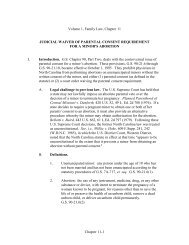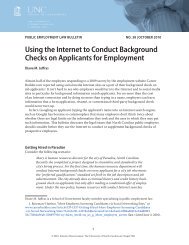Immunizations for Children and Adolescents - School of Government ...
Immunizations for Children and Adolescents - School of Government ...
Immunizations for Children and Adolescents - School of Government ...
You also want an ePaper? Increase the reach of your titles
YUMPU automatically turns print PDFs into web optimized ePapers that Google loves.
<strong>Immunizations</strong> <strong>for</strong> <strong>Children</strong> <strong>and</strong> <strong>Adolescents</strong> 13<br />
who may exercise HIPAA’s right <strong>of</strong> access to immunization records. 61 There is a limited exception<br />
to this when adolescents receive immunizations on their own consent, which is discussed<br />
in more detail below in the section, “Special Issues with Adolescent <strong>Immunizations</strong>.”<br />
33. Suppose there is an unpaid balance on a child’s account. Can a health care provider<br />
refuse to give the child’s parent a copy <strong>of</strong> the immunization record until the bill is paid?<br />
No. HIPAA grants patients or their personal representatives a right <strong>of</strong> access to in<strong>for</strong>mation<br />
which includes the right to obtain a copy <strong>of</strong> a record. 62 Although there are a few circumstances<br />
in which the right <strong>of</strong> access may be denied, they are quite limited <strong>and</strong> this circumstance is not<br />
one <strong>of</strong> them. 63<br />
Special Issues with Adolescent <strong>Immunizations</strong><br />
34. May adolescents consent to their own immunizations?<br />
Under North Carolina’s minor’s consent law, some adolescents may consent to receive immunizations<br />
on their own. The law allows physicians to accept an unemancipated minor’s consent<br />
<strong>for</strong> the prevention <strong>of</strong> venereal diseases <strong>and</strong> reportable communicable diseases. 64 Most <strong>of</strong> the<br />
immunizations that are required or recommended <strong>for</strong> children <strong>and</strong> adolescents prevent either<br />
venereal diseases or communicable diseases that are reportable under North Carolina law. 65<br />
The minor’s consent law there<strong>for</strong>e authorizes physicians to accept a minor’s consent <strong>for</strong> those<br />
immunizations.<br />
The law actually says that “any” minor may give effective consent, but “any” must not be taken<br />
literally. A health care provider must not accept a minor’s consent unless the minor has both<br />
legal capacity to consent to the treatment, <strong>and</strong> decisional capacity (or competence)—that is, the<br />
ability to underst<strong>and</strong> health care treatment options <strong>and</strong> make in<strong>for</strong>med decisions. Ordinarily,<br />
unemancipated minors lack the legal capacity to consent to their own treatment. The minor’s<br />
consent law gives unemancipated minors legal capacity to consent to immunizations <strong>for</strong> venereal<br />
disease or reportable communicable diseases, but a health care provider still must deter-<br />
61. 45 C.F.R. 164.502(g)(3).<br />
62. 45 C.F.R. 164.524; see also question 32.<br />
63. See also North Carolina Medical Board, Position Statement: Access to Medical Records (August<br />
2003), available at www.ncmedboard.org/position_statements/detail/access_to_medical_records/<br />
(“Medical records should not be withheld because an account is overdue or a bill is owed.”).<br />
64. G.S. 90-21.5 authorizes physicians <strong>and</strong> those working under their supervision to accept an unemancipated<br />
minor’s consent <strong>for</strong> the prevention, diagnosis, <strong>and</strong> treatment <strong>of</strong> (1) venereal diseases <strong>and</strong><br />
reportable communicable diseases, (2) pregnancy (but not including sterilization or abortion), (3) abuse<br />
<strong>of</strong> controlled substances or alcohol (but not including inpatient services, except in emergencies), or (4)<br />
emotional disturbance (but not including inpatient services, except in emergencies). Emancipated minors<br />
may consent to most medical services. G.S. 90-21.51(b); see also footnote 35, supra.<br />
65. See 10A N.C.A.C. 41A .0101 <strong>for</strong> the complete list <strong>of</strong> communicable diseases that are reportable<br />
in North Carolina. Varicella is the only required vaccine that prevents a disease that is neither venereal<br />
nor reportable under North Carolina law. The following diseases <strong>for</strong> which vaccines are required are all<br />
reportable: diphtheria, tetanus, pertussis (whooping cough), polio, measles, mumps, rubella, haemophilus<br />
influenzae b, <strong>and</strong> hepatitis B.













